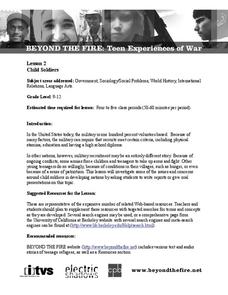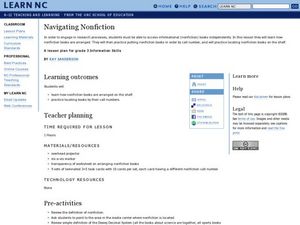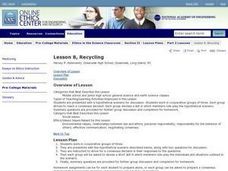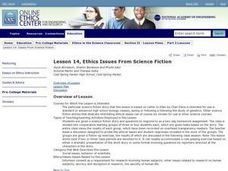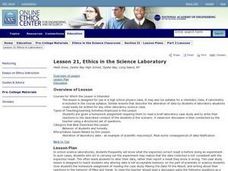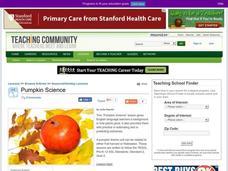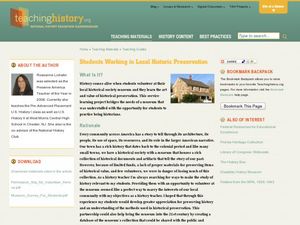Curated OER
English With Technology
Fourth graders use the smart board and their workbook to complete writing assignments based on parts of speech and sentence structure. In this writing lesson plan, 4th graders write, question, punctuate, and more.
Curated OER
Continents Adrift
Young scholars examine how tectonic plates change the Earth's land. In this geology lesson, students are divided into small groups to construct a continent puzzle. Young scholars use transparency pieces to demonstrate how Africa and...
Curated OER
Child Soldiers
Students investigate the military recruitment that exists in many foreign countries. They research the occurrence of using children in the military and its social implications. For research the activity contains a great variety of...
Curated OER
Navigating Nonfiction
Third graders explore the arrangement of nonfiction. In this library skills instructional activity, 3rd graders examine Dewey Decimal classification as they collaborate to locate nonfiction materials in the library/media center.
Curated OER
Our Geometric World
Third graders explore the attributes of polygons. In this geometric shapes lesson, 3rd graders review quadrilaterals, squares, rectangles, triangles, pentagons, hexagons, and octagons in order to create hanging polygons. Students then...
Curated OER
Forces of Change
Second graders discuss various ways in which landforms change over time. They, in groups, research and create a reference book about landform change including tsunamis, earthquakes, weathering, erosion and volcanic eruptions.
Curated OER
Discovering Dinosaurs: Planning your Summer Vacation
Students use the online Atlas of Canada to gather information about places in Canada.
Curated OER
Writing about the climate
Learners research the contributing factors to the Earth's paleoclimate. They determine the relevant climate data and use it to construct a science argument. In the process, they access data, capture images of the data plots, and...
Curated OER
Mighty Minerals-We Use Them Everyday
Third graders investigate the importance of knowing about rocks and minerals. They study the way in which many products are produced from rocks and minerals. Students are shown how we obtain many of the rocks and minerals we use.
Curated OER
What Are the Advantages and Disadvantages of Using Condoms During Sex
Students in an ESL classroom share any personal experiences they have had with people infected with the virus. In groups, they identify the advantages and disadvantages of using condoms during intercourse. They present their arguments...
Curated OER
Lesson 8, Recycling
Students examine recycling. In this environmental stewardship lesson plan, students practice persuading others to recycle as they collaborate to prepare small group skits. Students discuss the issue and write reflections about the...
Curated OER
Ethics Issues From Science Fiction
Students analyze ethics issues as they read science fiction works. For this science and ethics lesson, students read science fiction short stories of their choosing, investigate the ethics issues raised in the stories, and...
Curated OER
The Human Geonome Project Structured Controversy
Students debate government funding of the Human Genome Project. For this ethics lesson, students use the stuctured controversy framework to research the opposing viewpoints regarding project funding.
Curated OER
Whose Life Is It?
Students consider the implications of cloning. For this science and ethics lesson, students consider when cases of cloning are ethical and when they are not as they discuss scenarios and their discussion questions.
Curated OER
Ethics in the Science Laboratory
Students consider the role of ethics in science lab procedures. In this ethics lesson, students explore a scenario that requires them to record their reactions to the case and the conduct of students in the case who alter laboratory data.
Curated OER
Discovering the World Virtually
Learners experience world adventures through the internet. In this technology lesson, students use a suggested internet site and explore each expedition. Learners can virtually travel such lands as China.
Curated OER
Memorials and Meaning
Students explore the Civil War. In this Civil War lesson, students collaborate to research the war. They examine Matthew Brady photographs that inspire them to create a memorial to honor those who served in the Civil War.
Curated OER
Magic Eye
Students discuss the history of tobacco bag stringing. In this primary documents history lesson, students closely examine photographs of families who worked stringing tobacco bags. This lesson includes discussion questions and a...
Curated OER
Pumpkin Science
Students investigate how plants grow by analyzing pumpkins. For this agricultural lesson, students read The Biggest Pumpkin Ever by Steven Kroll, and draw pictures of a pumpkin in each of its growing stages. Students measure and dissect...
Curated OER
Dot To Dot: Making a Dragon
Learners draw a dragon as they connect the dots. In this counting skills lesson, students count from 1-37 to complete a connect the dots puzzle and then discuss the Chinese New Year.
Curated OER
Unleash your digital natives
Students create a multimedia presentation. In this multimedia lesson plan, students use sound and visual images to compliment the sound for their multimedia presentation in the subjects of science or humanities.
Curated OER
Students Working in Local Historic Preservation
Young scholars develop an appreciation of history as they volunteer their time in historical museums. In this historical perspectives lesson, students work with valuable local documents as they aid the staff of selected local historical...
Curated OER
An Ancient Odyssey
Young scholars identify both the traditional myths and historical facts that are associated with geographical locations in ancient Greece. They create a "Travel to Ancient Greece" display to present their findings.
Curated OER
What Makes the Writer Write?
Students study Charles Dickens's Great Expectations to gain insight into a classical piece of fiction and to explain how writers respond to social conditions. They also consider how that response is important today.


